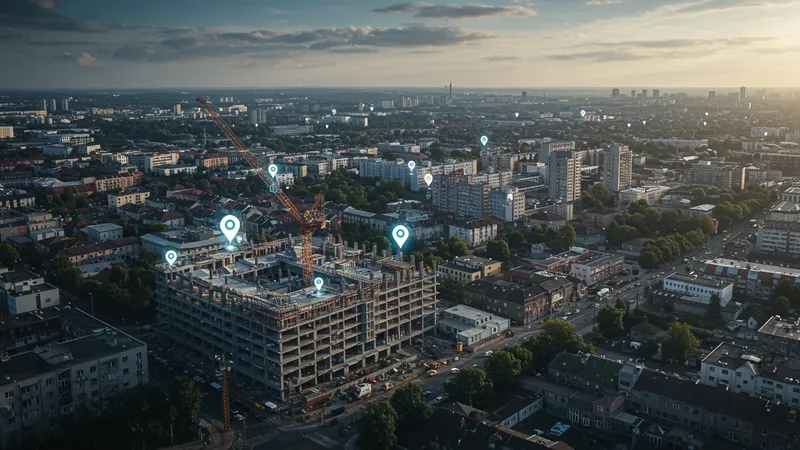

Imagine a world where real estate agents know what you want before you do. In 2025, artificial intelligence (AI) isn't just a tool; it's revolutionizing how we buy and sell homes. This isn't some distant dream—it's happening now!
The real estate industry is undergoing a transformation like never before. With the pandemic shifting our perspective on living and working environments, AI's role has become critical. Those in the know are already capitalizing on this trend, and you could be next.

Diving into the details, you learn that AI can assess property desirability by analyzing proximity to desired locations, commute times, and even community sentiment—a feat human agents could never achieve alone. And it doesn’t stop there. AI can predict which homes are prime candidates for selling based on owner habits and financial conditions. But that’s not even the wildest part…
AI is personalizing the buying experience. Imagine automated tours that adjust to your preferences or an agent that recommends a new build you’ve never considered, all powered by data analysis. With AI, the industry is moving towards an intuitive, efficient future. But what happens next shocks even the experts…
Behind the curtain, AI tools are working tirelessly to revolutionize real estate transactions. Business Insider reports that these tools are streamlining processes and making operations seamless and efficient. AI does not sleep, falter, or guess—it calculates and predicts. Yet, most people remain unaware of just how integral these tools are to modern transactions.

AI predictive models are proving to be the industry's secret weapon. By processing vast amounts of market data, they anticipate trends before they happen. This foresight grants brokers a formidable edge, prompting potential sellers and buyers to adjust strategies long before their competitors even see a change coming. Yet, there’s still more hidden behind this powerful algorithm…
AI innovations are leveraging advanced algorithms to personalize client interactions. Picture receiving a tailored newsletter that showcases properties aligned perfectly with your unique taste and budget. Agents use these AI-powered tools not just for searching but also to nurture and retain clients—a lifeline in the competitive real estate market.
Moreover, AI's role extends to chatting with clients, analyzing data to suggest price adjustments, and refining marketing strategies. The possibilities are constantly expanding, and just when you think you’ve seen it all, AI surprises with another innovation. What you read next might change how you see this forever.
Have you ever wished someone could predict price hikes or drops in your neighborhood? AI is your answer. These sophisticated systems can forecast pricing trends by analyzing historical data, current market conditions, and even economic indicators with a precision that no human could rival. But the real magic lies in what this means for buyers and sellers.

For potential buyers, AI offers peace of mind. With precise price predictions, committing to a new property becomes less of a gamble and more of an informed decision. Meanwhile, sellers gain confidence in knowing when is the most opportune time to make their move, preventing missteps that could cost precious dollars.
AI solutions also break down barriers for first-time buyers who often feel excluded by the intricate complexities of real estate markets. By simplifying data into actionable insights, AI levels the playing field, offering access to privileges once reserved for more experienced investors. But wait, there’s another layer to peel back…
These AI systems continuously evolve, learning from each transaction to refine their accuracy. This dynamic nature means that as markets shift, so too does the AI's ability to anticipate changes, making it an invaluable ally for anyone—agents, investors, homeowners—maneuvering these uncertain waters. But can AI predict where this technological trend will lead us next?
It seems almost magical, the way AI is shaping the very walls we live within. Today's AI tools are stepping boldly into the domain of architecture and property design, offering unprecedented precision and creativity. They’re training on vast design datasets, learning the nuances of aesthetic preferences across demographics and regions.

In this evolving landscape, AI assists architects in creating buildings that are not only beautiful but also hyper-functionally aligned with modern urban needs. By predicting future requirements based on present trends, AI helps design spaces that remain relevant and adaptable. Such foresight can be pivotal in avoiding the pitfalls of obsolescence.
The impact extends to the materials used, too. AI analyzes environmental data to suggest sustainable materials that reduce the carbon footprint and boost energy efficiency, without compromising on style or durability. This confluence of technology and sustainability stands at the forefront of future building innovations.
And don't forget about customization. Homes equipped with AI can learn and adapt to their inhabitants, altering environments for comfort and efficiency. The possibilities are astounding, and yet, we’ve hardly scratched the surface of AI’s potential in real estate design. Because as groundbreaking as this development is, it's the tip of the iceberg…
In the bustling world of real estate, standing out is everything. Enter AI—the linchpin for agents looking to market properties with precision and flair. With the power to analyze consumer behaviors and devise highly-targeted marketing campaigns, AI transforms how properties are pitched to potential buyers.

Marketing with AI isn’t just about pushing a sale; it’s about crafting a story. Buyers receive personalized content that speaks directly to them, guided by data-driven insights into what provokes interest and what doesn’t. This persona-based strategy ensures that messages resonate, increasing engagement and potential conversions exponentially.
Furthermore, AI enhances virtual tours, offering interactive experiences that leave a memorable imprint on potential buyers, bringing them a step closer to making an offer. These tools can make or break a deal in today’s digital-first market landscape, redefining marketing success.
But the revolutionary aspect of AI in marketing lies yet ahead. The technology is continually learning, adapting, fine-tuning its algorithms for even greater precision. This leap forward challenges the very foundation of traditional marketing practices. And while that’s thrilling for some, it's daunting for others unprepared for the new status quo.
Imagine viewing properties not just in 2D photos or videos but walking through homes from thousands of miles away—all thanks to the symbiotic relationship between AI and virtual reality (VR). It's becoming the gold standard for real estate tours, erasing geographic and logistical barriers in one fell swoop.

VR combined with AI personalizes these tours by adjusting environments in real-time, reflecting potential buyers' preferences from paint colors to virtual placements of their existing furniture. Such customization can be the tipping point that turns indecision into a confident purchase.
Moreover, AI's ability to collect data during VR experiences offers insights into buyer behavior that were previously unattainable. How long does a viewer linger in the kitchen area? What features captivate them the most? This actionable intelligence enables agents to refine their pitches with pinpoint accuracy.
The fusion of AI and VR not only enhances the buying experience but also provides vital feedback to sellers, architects, and marketers. It reshapes expectations while raising the bar for the entire industry. But as we explore future possibilities, one question remains: are we ready for AI’s influence to extend even deeper into our real estate realities?
While AI brings numerous advantages, there's an ethical debate simmering beneath its shiny surface. Deploying AI in real estate poses questions about privacy, decision-making, and equality. Should machines wield such decision-making power in ironing out human-centric challenges?

Critics argue that AI-driven models may inadvertently enshrine bias. These systems, after all, learn from historical data, which could reflect past inequities. This prompts an urgent need for transparency and fairness within algorithms used to predict market trends, housing prices, and buyer behaviors.
Moreover, there’s the issue of data privacy. As AI collects and analyzes more extensive data to personalize experiences, maintaining user privacy becomes paramount. Real estate professionals must strike a balance between technological optimization and ethical responsibility.
In grappling with these questions, the industry faces a necessary moment of introspection. It’s vital to incorporate ethical guidelines into the innovation framework, ensuring AI advancements serve everyone equitably. As the dialogue continues, the very essence of the real estate profession is being redefined by these technological ethics.
Picture AI sitting at the negotiation table, assisting with strategy and negotiation tactics. Real estate transactions are notorious for their complexity and negotiation stages that test even the most seasoned agents. But AI changes the dynamics, turning realists into strategists.

With its ability to analyze market variables effortlessly, AI offers real-time data insights that form a crucial edge during negotiations. It identifies property values, spotlights maintenance concerns, and even predicts likely negotiation outcomes—ensuring prepared agents armed with hard facts marinated in strategy.
For clients, AI’s presence in negotiations also means increased transparency and fairness. Automated processes ensure that biases or oversight don’t taint discussions, promoting equitable solutions and fostering trust between parties above all else.
Yet the integration of AI here might suggest a future where human negotiation becomes secondary. It's an exciting yet daunting prospect, raising questions about the future role of agents the world over. Nobody is quite sure where this path will lead, but one thing’s certain: real estate negotiations will never be the same.
The ripples of AI in real estate are being felt worldwide. In emerging markets, AI enables access to properties previously obstructed by knowledge gaps. Populations gain access to crucial market data, emboldening them to stake claims in areas previously beyond reach.

In established markets, AI encourages efficiency, reducing transaction costs and speeding up processes that traditionally hindered progress. By minimizing manual tasks, AI allows professionals to prioritize what they do best— connecting with people and creating lasting client relationships.
However, with global implementation comes challenges unique to regional variations. AI models must adapt to distinct market nuances to remain relevant, from differing legal frameworks to unique economic conditions. Simplifying complexities while contextualizing insights remains AI's most promising frontier.
Countries differ in their readiness to adopt these technologies, posing challenges to equitable advancement. As AI continues forging its global path, stakeholders must ensure that all markets can benefit from its transformative power. There are yet many corridors to explore, each offering its opportunities…
In the realm of property management, AI is an unstoppable force, streamlining tasks and enhancing tenant experiences. Imagine an AI assisting landlords by automatically scheduling maintenance, optimizing rental prices based on demand, and even predicting tenant turnover.

For property managers, AI takes the burden of routine tasks, freeing time for more strategic pursuits. An AI can analyze tenant feedback, suggest improvements, and prioritize issues, enhancing satisfaction and ensuring long-term occupancy.
On the tenant side, AI-driven platforms simplify maintenance requests and communicate updates, delivering seamless precision. Such enhancements drive tenant retention, potentially increasing property value as satisfied inhabitants naturally become advocates for their residences.
The revolution lies not in automation alone, but in the enhanced capacity for personal interaction AI provides. As the mundane is managed by algorithms, property managers can focus on nurturing tenant relationships—an unbeatable combination for contemporary management success.
As AI continues to shape real estate, investment strategies are evolving. No longer reserved for a select few, the AI-powered approach levels the playing field, offering insights that fuel smarter, more agile investment decisions.

AI harnesses massive datasets to guide investors towards opportunities ripe for growth. By predicting market shifts and analyzing financial returns, AI provides a competitive advantage previously unimaginable. But there's more than just profit potential at stake.
Smarter investment means fewer speculative risks and more data-driven assurance. In an industry fraught with uncertainties, AI offers peace of mind, inviting a broader spectrum of players while encouraging comprehensive planning over opportunism.
The impact resonates with institutional investors and individual go-getters alike, who avail AI's precision to bolster portfolios with well-timed, lucrative acquisitions. As AI-powered investment becomes the norm, the boundaries of possibility expand, leading to an entirely new era of real estate opportunity.
As AI infiltrates real estate, the role of agents and brokers cannot remain stagnant. Emerging technologies demand new skills, ongoing education, and the ability to harness AI’s potential effectively. The industry stands at a crossroads, choosing evolution over tradition.

For agents, mastering AI means embracing tools that boost productivity, from AI-powered CRM systems to AI-driven client interaction platforms. These innovations spell the difference between leading the market and lagging behind.
Beyond familiarization, professionals must also engage with ethical considerations brought forth by AI's power, understanding both its advantages and challenges. This ethical literacy ensures responsible use of AI, fostering trust with clients who expect transparency in every transaction.
A proactive approach—engaging in seminars, workshops, and courses—positions agents to lead confidently in this AI-driven era. As they did with past technological waves, real estate professionals will adapt, thriving in an evolved landscape they once could only imagine.
Secondary markets, those often overshadowed by bustling metropolises, find themselves rejuvenated by AI technologies. Growth opportunities are being identified in places once considered peripheral, giving rise to novel investment landscapes.

Through AI, agents discover untapped potential by recognizing undervalued areas poised for rapid development. Such data-driven insights shift focus from overtly saturated markets to those offering fresh opportunities with equally promising returns.
For developers and investors, understanding the nuances of these markets means leveraging AI for accuracy in development and deployment. It refines decision-making, predicting which regions will benefit from infrastructural investments and which will sustain long-term growth.
The rise of AI even in secondary and tertiary markets poses challenging yet exciting prospects for all involved. Preparation, adaptability, and strategic vision will ensure continued success as these once-overlooked territories emerge into the spotlight, thriving via data-guided approaches.
As AI becomes an indispensable facet of real estate, ensuring safety and reliability becomes paramount. AI safety nets are the buffers designed to safeguard stakeholders from potential data mishaps and ethical pitfalls, setting standards in accountability.

A robust safety system ensures transparency in AI-driven transactions and provides measures to rectify discrepancies swiftly. This assurance elevates confidence in AI’s capabilities, essential in an industry where trust is the bedrock of business.
For developers, safety nets mean embracing frameworks that uphold privacy and security, ensuring compliance with industry regulations. For users, assurance arises from knowing AI systems work as intended, instilling faith in AI's potential without sacrificing individual integrity.
Laying down these safety nets is central to AI's continued success, allowing it to transform real estate with the confidence of all parties assured. As AI-powered tools evolve, this safety framework continues to expand alongside them, offering a sturdy anchor in an ocean of change.
AI is reshaping real estate in ways we once deemed impossible, turning dreams into streamlined realities. This technological wave carries lessons and opportunities, urging professionals to embrace the change and innovate with intention. As we navigate this transformed landscape, the profound takeaway is clear: AI isn't just about technology—it's about changing the way we experience the world. Share this journey, bookmark these insights, and become a part of the future today. Together, let’s redefine what's possible in real estate.